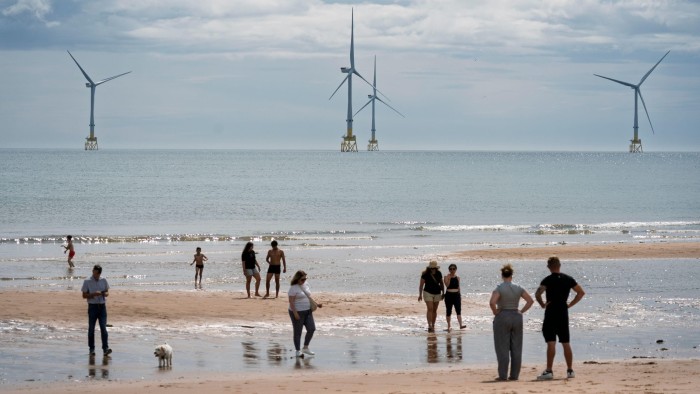Unlock the White House Watch newsletter for free
Your guide to what Trump’s second term means for Washington, business and the world
Aberdeen’s biggest industry and its potential future can both be viewed from a hillside café near its new £420mn south harbour. Many of the ships that service North Sea oil and gas rigs are docked in the port below, and up the coast lie Donald Trump’s new golf course and an offshore wind farm that annoys him.
I happened to sit there the day after the US president flew out of Scotland last week, having played golf and castigated the UK’s net zero policies. “They have essentially told drillers and oil companies that, ‘we don’t want you’,” he posted on his Truth Social platform about its high taxes on offshore oil and gas, and ambitions to switch to renewable energy.
Plenty of people in Aberdeen, known for its prosperous decades as the oil and gas capital of Europe, agree with Trump about taxes and the UK ban on new licences for the exploration of fossil fuels under Sir Keir Starmer’s government. “It just feels like a big ‘no’ to any discussion of oil and gas,” said Roddy James, the port’s chief commercial officer, as we surveyed the scene.
But they disagree with Trump about the “windmills” that he and the UK Reform party detest. The city’s energy industry sees offshore wind as its future, and craves a steady transition. The fear of the energy services groups that employ many of the 45,000 locals in the sector is that they will get lost on the way, along with Aberdeen’s economy.
On my visit, I found a city fighting the erosion of the cluster of companies and skills on which it relies, while trying to forge a new economy. The UK government’s industrial strategy envisages a doubling of annual business investment in clean energy to £30bn by 2035, but making it work in Aberdeen is more complex in practice than on paper.
“We talk about survival and Aberdeen being a resilient place, but I want our business to grow,” Sarah Moore, chief executive of Peterson Energy Logistics, one of the biggest local suppliers, told me. The problem is that such companies need continued work from oil and gas work to stay committed to the UK while they diversify.
There are worrying signs: Harbour Energy, the UK-based independent oil and gas company, said in May that it will cut its Aberdeen workforce by 250 jobs — a quarter of the total — due to the “challenging domestic fiscal and regulatory environment”. While it lacks Trump’s way with words, the message was similar.
Some shrinkage is inevitable. Once built, it takes fewer ships and workers to maintain a wind turbine than an oil and gas rig: Aberdeen Port estimates that only a quarter of the number of service vessels per gigawatt will be needed at any time. That is one reason why it invested in building a new harbour that can accommodate cruise ships for the growing number of tourists.
But other damage is self-inflicted. The largest vessel in Aberdeen last week was the Intrepid Noble rig, which was being serviced before heading to the North Sea to drill a well for DNO Norge. Norway keeps granting licences and last year provided about half of the UK’s gas imports, which now account for two-thirds of domestic demand as the UK’s own supplies are reduced.
“We need a smooth transition and it does not feel like that at all,” said Maggie McGinlay, chief executive of Aberdeen’s Energy Transition Zone, a government-supported project that is cited in its industrial strategy. Business investment is critical to ETZ’s brownfield site near the harbour but, as McGinlay observed, “once you lose companies, it is hard to get them back”.
The government should realise this, given the struggles of cities that suffered from industrial decline. It puts clusters at the heart of its strategy for growth and Aberdeen’s energy cluster made it into one of the highest-income and fastest-growing UK cities until a decline after the financial crisis. The city retains an entrepreneurial spirit that the country would be stupid to squander.
Although North Sea reserves are in long-term decline, the government’s licensing policy and effective 78 per cent windfall tax rate on oil and gas profits are accelerating the loss. Unless these change soon, Aberdeen will struggle to bridge the gap with renewables: the Scottish government last week approved the Berwick Bank wind farm but the city is waiting for others.
Trump and Reform are hostile to the transition to wind and renewables, while the prime minister wants one but is making it harder for Aberdeen’s people. The granite city is in danger of getting trapped.
[email protected]
